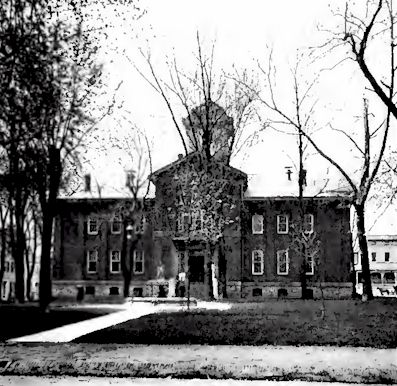|
Welcome
to Maryland American
History and Genealogy Project
we are in the process of
building new State and County pages for the states where
the coordinator has moved on to other projects.
Frederick County is looking for a new Coordinator would you
be interested? If so please contact
Webmaster.
Many of the present coordinators are always willing to give help and
suggestions to newcomers, you can learn, I did and that was after 60!!
Read our
About Page and see what our requirements are,
pretty easy!


Courthouse at Frederick
Frederick County was organized in 1748, named after the
Prince of Wales, and has an area of 633 square miles,
being the second largest Maryland County. Its topography
is agreeably diversified by valley, plain, rolling land
and mountain. Many of the early settlers were Germans.
The county has always furnished its full quota of
soldiers and sailors in war time, from colonial days to
the war with Spain. The author of "The Star-Spangled
Banner" was born here, and his remains rest in Mt.
Olivet Cemetery, in the city of Frederick, beneath the
monument erected by the Key Monument Association, and
unveiled August 9, 1899.
On November 23, 1765, the judges of the Frederick County
Court repudiated the Stamp Act passed by the British
Parliament, and Repudiation Day was made a county
holiday in 1894.
Agriculture is the leading industry, the soil being
fertile and producing large crops of wheat, corn, rye,
oats and potatoes. The mountain districts still supply a
good quality of oak, chestnut, walnut, hickory and other
timber. The railroads are the Baltimore and Ohio, the
Western Maryland, Pennsylvania, and an electric road
runs from Frederick to Myersville. Iron ore and copper
are found in different parts of the county, the most
extensive deposits of the former being in the northern
section, near Thurmont, where a large smelting plant is
located, the Catoctin Furnace, first put in operation in
1774. Near Libertytown copper mines are worked on an
extensive scale. Frederick City, sixty-one miles from
Baltimore, has a population of 9,296, and is the county
seat.
A female seminary, Frederick College, and other
important private educational institutions are located
there, as is also the Maryland School for the Deaf.
Manufactured products of the county include lumber,
flour, fibre brushes, fertilizer, furniture, harness,
hosiery, crockery-ware, lime, proprietary articles, etc.
Frederick towns include Brunswick, Emmitsburg (near
which is Mt. St. Mary's College), Thurmont,
Walkersville, Middletown, Buckeystown, Adamstown. Point
of Rocks, Creagerstown, Wolfsville, Urbana, Libertytown,
New Market, Ijamsville, Sabillasville, Woodsboro,
Knoxville, Mt. Pleasant, Jefferson, Graceham,
Myersville, Harmony, Johnsville, Ladiesburg, Unionville,
Lewistown, Attica Mills, Burkittsville.
Online Here or Other Sites
Maryland
AHGP

Source: History of Maryland, by
L. Magruder Passano, Wm. J.C. Dulany Company, 1901.
|



